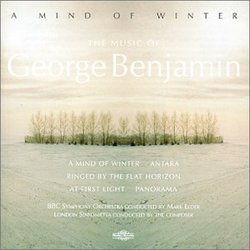| All Artists: George Benjamin, Mark Elder, BBC Symphony Orchestra, London Sinfonietta, Penelope Walmsley-Clark Title: A Mind of Winter Members Wishing: 0 Total Copies: 0 Label: Nimbus Records Original Release Date: 1/1/2000 Re-Release Date: 4/11/2000 Genres: Pop, Classical Styles: Vocal Pop, Opera & Classical Vocal, Historical Periods, Modern, 20th, & 21st Century, Symphonies Number of Discs: 1 SwapaCD Credits: 1 UPC: 710357564321 |
Search - George Benjamin, Mark Elder, BBC Symphony Orchestra :: A Mind of Winter
 | George Benjamin, Mark Elder, BBC Symphony Orchestra A Mind of Winter Genres: Pop, Classical
|
Larger Image |
CD Details |
CD ReviewsThe master orchestrator side of Benjamin in the spotlight Christopher Culver | 09/12/2007 (4 out of 5 stars) "Among contemporary composers George Benjamin is one of the most prominent fans of the orchestra. Though his style is nothing like that of the great French master, Benjamin studied under Olivier Messiaen and certainly gained a desire to think big from him. The four major works on this Nimbus CD--a reissue for the composer's 40th birthday of an earlier LP that lacked "Antara" and "Panorama"--are a fine example of Benjamin's writing for large forces.
Benjamin's first orchestral work was "Ringed by the Flat Horizon" (1979-80). Written when the composer was not yet twenty years old, it catapulted him to fame when it appeared at the Proms. An immature work this is not, as there's a compelling dramatic element. The cello has a prominent role (here played by Ross Pople), a somewhat lyrical voice going against the urgency and hysteria of the ensemble. Mark Elder leads the BBC Symphony Orchestra, the same performers as in the world premiere. In the following pieces, the composer himself conducts the London Sinfonietta. "A Mind of Winter" for soprano and chamber orchestra (1981) is my favourite of the works on this disc. In this setting of a Wallace Stevens poem, a static, crystalline soundworld initially predominates, one of the few instances one can compare Benjamin to Messiaen. The soprano's voice, piercing the orchestral textures, is striking, and I absolutely love the last two minutes or so, where the voice and ensemble go from blockiness to a lush cloud. Here Penelope Walmsley-Clark is soprano solo. "At First Light" for chamber ensemble (1982) is my least favourite work here. It's overlong, and there's little perceivable form. However one does admire how much sound Benjamin elicits from only 14 players. Furthermore, there are some unusual touches such as squeaking sounds like something out of Per Norgard's Symphony No. 5. "Antara" for orchestra and electronics (1985-87) was written after Benjamin studied at IRCAM, the centre for music research in Paris which had hardly got running when the composer visited. The story goes that while Benjamin was receiving instruction in state-of-the-art computer technologies, he found musical stimulation from nearby South American buskers playing simple panpipes. Using IRCAM's resources, he created sounds of that ancient instrument, ranging from conventional ones to merely theoretical pipes many metres long, which are played by a keyboardist alongside the orchestra. Added to the mix are sampled sounds of the Centre George Pampidou, the building housing the laboratory. The result is not one of IRCAM's greatest hits (I favour, say, Boulez' "...explosante-fixe..." or Saariaho's "Amers"), but fun listening. "Panorama" for tape is a brief technical study Benjamin created before writing "Antara". I rate this disc less than five stars because, for all his skill as an orchestrator, one may feel that a sense of innovation is lacking here. Those looking for fresh new ideas from the man would do better to check out another Nimbus disc with "Shadowlines" for piano and "Viola, Viola" for two violas. Nonetheless, fans of IRCAM and of contemporary orchestral writing may find this a splendid record." |

 Track Listings (7) - Disc #1
Track Listings (7) - Disc #1